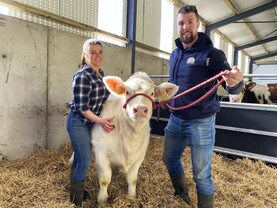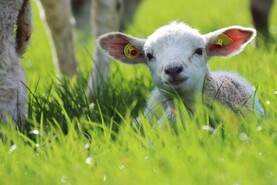Methane emissions from dairy cows were not affected by cross breeding or different levels of concentrate feeding, a study conducted at AFBI Hillsborough has found.
A selection of Holstein-bred cows and crossbred cows with Swedish Red, Jersey and
Holstein genetics were used in the experiment. The cows were at grass full time and were assigned two different levels of concentrate input at either 3kg or 6kg per head per day.
Methane
Methane production was recorded by the sulfur hexafluoride (SF6) technique where gas canisters are fitted to cows to quantify emissions whilst at grass.
Measurements were taken on three occasions over the grazing season with each lasting for five consecutive 24-hour periods.
The AFBI researchers also found that increasing concentrate levels had no effect on daily methane emissions per cow
The study, published in the scientific journal Agricultural and Food Science, found that genetics had no significant impact on methane production when calculated as both emissions per cow and emissions per litre of milk.
The AFBI researchers also found that increasing concentrate levels had no effect on daily methane emissions per cow, but it did reduce emissions per litre as cows on the higher meal rate produced more milk.
For example, cows on 6kg of concentrates averaged 22.9l of milk with methane emissions of 11.4g/l. This compares to 20.0l and 12.4g/l of methane among the lower feed rate group.
Read more
Watch: 17% variation in methane emissions within the same breed
More solutions emerge to dramatically reduce cattle methane emissions
Methane emissions from dairy cows were not affected by cross breeding or different levels of concentrate feeding, a study conducted at AFBI Hillsborough has found.
A selection of Holstein-bred cows and crossbred cows with Swedish Red, Jersey and
Holstein genetics were used in the experiment. The cows were at grass full time and were assigned two different levels of concentrate input at either 3kg or 6kg per head per day.
Methane
Methane production was recorded by the sulfur hexafluoride (SF6) technique where gas canisters are fitted to cows to quantify emissions whilst at grass.
Measurements were taken on three occasions over the grazing season with each lasting for five consecutive 24-hour periods.
The AFBI researchers also found that increasing concentrate levels had no effect on daily methane emissions per cow
The study, published in the scientific journal Agricultural and Food Science, found that genetics had no significant impact on methane production when calculated as both emissions per cow and emissions per litre of milk.
The AFBI researchers also found that increasing concentrate levels had no effect on daily methane emissions per cow, but it did reduce emissions per litre as cows on the higher meal rate produced more milk.
For example, cows on 6kg of concentrates averaged 22.9l of milk with methane emissions of 11.4g/l. This compares to 20.0l and 12.4g/l of methane among the lower feed rate group.
Read more
Watch: 17% variation in methane emissions within the same breed
More solutions emerge to dramatically reduce cattle methane emissions






 This is a subscriber-only article
This is a subscriber-only article









SHARING OPTIONS: